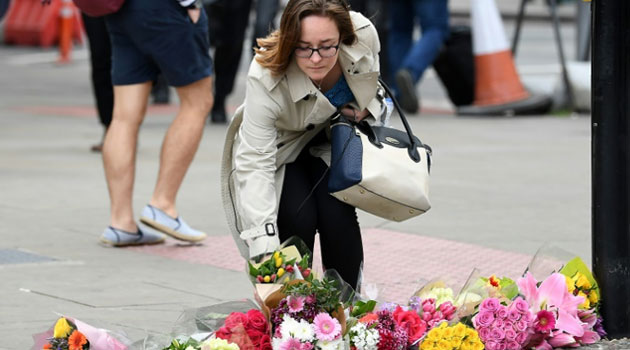
A woman lays a bouquet of flowers at a pedestrian crossing by Borough market following attacks which left eight people dead/AFP
NAIROBI, Kenya, Jun 7 – As the war on violent extremism and terrorism continues to become sophisticated around the globe, various governments are opting to adopt what seems to be tougher measures including sealing legal loopholes.
In 2014, Kenya adopted new security laws that provided for hefty fines against those found guilty, after tens of terror attacks that claimed hundreds of lives.
It appears to be the new trend in the world after British Prime Minister Theresa May declared that human rights that may get in their way while dealing with the menace will be changed.
“I mean longer prison sentences for those convicted for terrorism offences; I mean making it easier for the authorities to deport foreign terrorist suspects to their own country,” the British Prime Minister asserted.
She added that “and I mean doing more to restrict the freedom of movement of terror suspects when we have enough evidence to know they are a threat and not enough evidence to prosecute them in court and if our human rights laws stop us from doing it, we will change the laws so we can do it.”
To successfully deal with the menace, Independent Medico Legal Unit Executive Director Peter Kiama says authorities across the globe must enhance their partnership with the public as part of what he terms as a radical surgery within the security agencies.
In Kenya, he says the organisation is planning to train police officers more so at the local level on the need to work closely with the public and create awareness among Kenyans on the importance of cooperating with authorities.
“In the war against terrorism, whether it is in Europe or Africa, we should never allow ourselves to depart from the only safeguard we have, which is the rule of the law. It allows the government to exempt particular rights in serious situations where our democracy has become in real danger like now. Because terrorism is quite complex, investigating in terrorism, is not investigating chicken theft. It is more complicated,” the IMLU boss said during Capital FM News on Wednesday.
In Kenya’s case, he noted that police can detain a terror suspect for more than 24 hours, but it must be approved by a court of law.
He said the world, more than ever needs to work towards a people-centered security service for them to get timely intelligence.
“Our biggest test when faced with the serious danger of terrorism and organized criminal gangs, is to bring out the best in ourselves…we should respond guided by the rule of the law,” he stated.
“The government is given the power to declare a state of emergency if our democracy is under a threat but it has a clear guideline with the constitution.”
His sentiments are shared by security experts, who insist that robust measures must be adopted to curb the menace.
Former National Security Agency Analyst and Counter Intelligence Officer in Britain, John Schindler writing in the Observer, warns that if Britain doesn’t soon devise tough counter measures to its vast domestic jihadist problem “many of its cities may come to resemble Northern Ireland a generation ago, with armed soldiers in battle gear patrolling the streets as “aid to civil power” while enforcing frequent security checks on average citizens with the aim of stopping terrorists.”
According to him, British intelligence estimates that the number of jihadists in the country is a staggering 23,000 people – of whom 3,000 pose a potentially imminent threat to public safety.
READ: The growing complexities of terrorism across the globe
“Moreover, even if the number of potential terrorists requiring close watching by the secret state is “only” 3,000, that target pool vastly exceeds the capabilities of British intelligence,” he points out.
“Although little is understood by the public, maintaining effective 24/7 human and technical surveillance is enormously costly in manpower and resources, even for top-notch security services like MI5.”
It is a trend that has led to Britain’s Prime Minister earlier declaration of “enough is enough.”
May said the current security challenges in Britain and the world cannot be eliminated by “military intervention only.”
“It will not be defeated by the maintenance of a permanent defensive counter-terrorism operation, however skillful its leaders and practitioners.
“It will only be defeated when we turn people’s minds away from this violence and make them understand that our values – pluralistic British values – are superior to anything offered by the preachers and supporters of hate,” were her words on June 4, after the London Bridge attack.








































